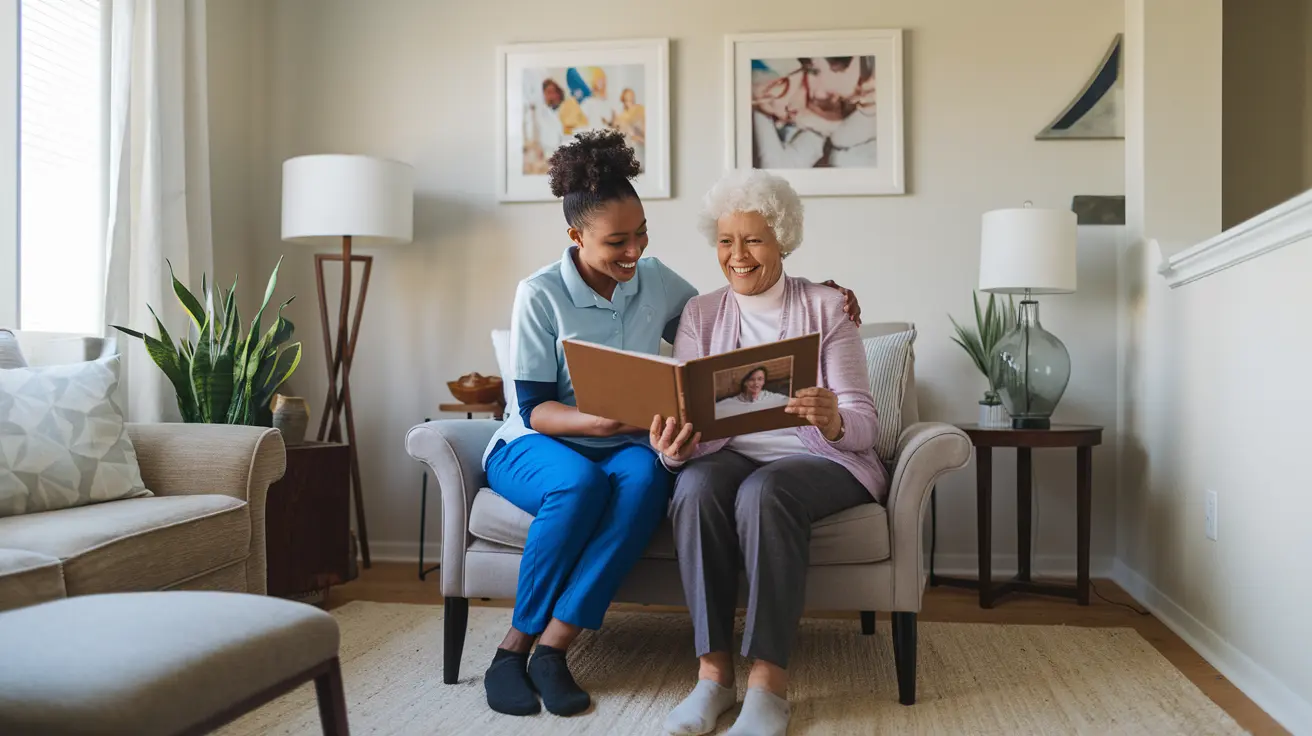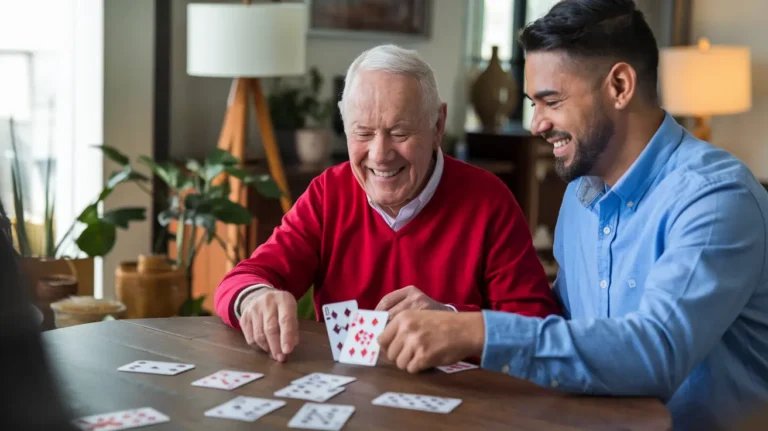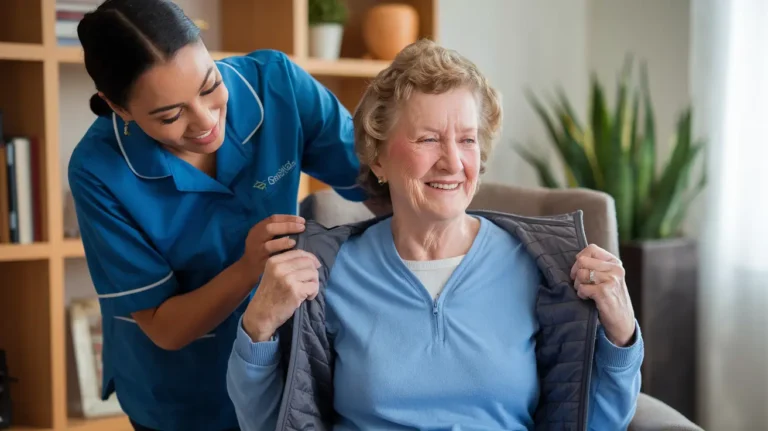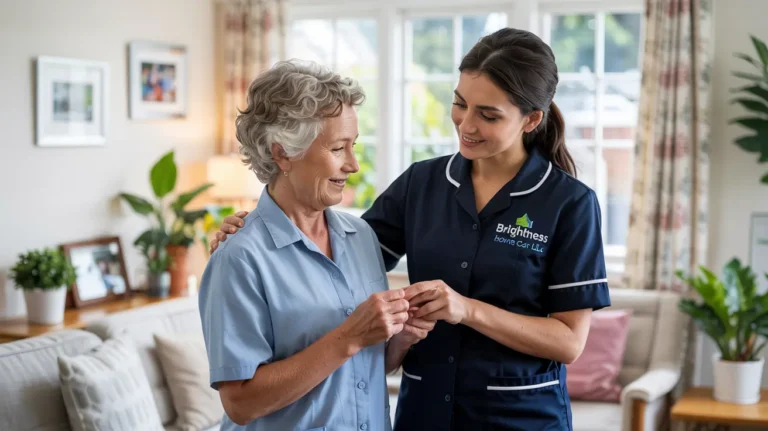Senior Companion Care in Indianapolis: A Complete Guide for Families
Did you know that over 15% of Indianapolis residents are 65 or older? That’s nearly 150,000 seniors in our city who might need some level of assistance! I remember when my own mother started needing help around the house, and let me tell you, finding the right support was a game-changer for our entire family.
Senior companion care has become one of the most sought-after services for families like yours who want to help their aging loved ones maintain independence while ensuring they receive proper care and attention. It’s not just about having someone check in occasionally – it’s about providing meaningful human connection that can drastically improve quality of life.
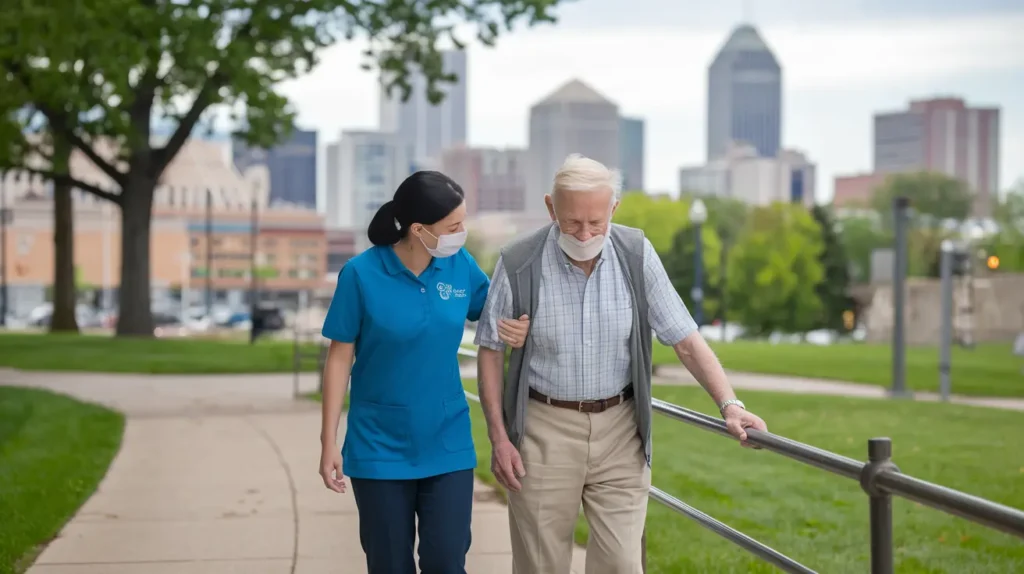
As someone who’s been through the process of finding elder care in Indianapolis, I know how overwhelming it can feel! There are so many options, and the stakes feel incredibly high when it’s your parent or grandparent’s wellbeing on the line. That’s where specialized providers like Brightness Home Care LLC come in, offering personalized companion services right here in Indianapolis at their location on West 38th Street.
Throughout this guide, I’ll share everything I’ve learned about senior companion care – from what exactly it includes to how to choose the right provider for your situation. Let’s navigate this journey together!
What is Senior Companion Care?
Companion care is something I wish I’d known about years ago! Essentially, it’s a type of non-medical home care service where a caregiver spends time with a senior, providing social interaction, emotional support, and assistance with everyday tasks. Unlike skilled nursing or home health aides who focus primarily on medical needs, companion caregivers concentrate on improving quality of life through meaningful human connection.
I remember thinking my dad just needed someone to help with his medication, but what he really needed was someone to talk to about his woodworking hobby! Companion care fills that crucial gap between medical necessity and emotional wellbeing. It’s designed for seniors who are generally independent but could use extra support to maintain that independence safely.
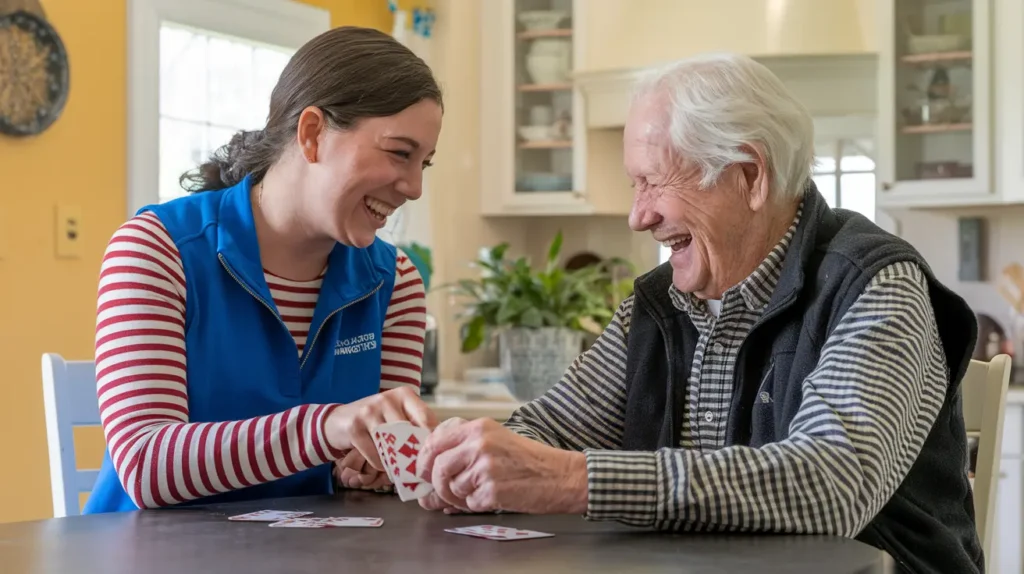
The services typically include friendly conversation, help with light housekeeping, meal preparation, transportation to appointments or social events, medication reminders, and assistance with everyday activities. It’s basically having a trustworthy friend who also happens to be trained in senior care – how awesome is that?
Companion care works best for seniors who are still relatively independent but might be experiencing isolation, mild cognitive changes, or physical limitations that make certain tasks challenging. My neighbor’s mother has early-stage dementia but is still active and engaged – her companion helps keep her organized and provides crucial social stimulation that her busy family can’t always provide.
The beauty of companion care is its flexibility. Some seniors might need someone just a few hours a week for transportation and errands, while others benefit from daily visits for more comprehensive support. When my aunt started using companion services, they began with twice-weekly visits but eventually increased to daily check-ins as her needs changed.
One common misconception I had was thinking companion care was the same as home health. Not true at all! While home health provides medical services prescribed by doctors, companion care focuses on the social and practical aspects of daily living. Think of it as the difference between having a nurse visit versus having a helpful friend stop by – both valuable, but serving different needs!
The activities provided vary widely based on the senior’s interests and abilities. For my uncle who loves gardening, his companion helps him tend to his tomato plants and takes him to the garden center. For my friend’s mom who was once a librarian, her companion takes her to book club meetings and reads with her. It’s wonderfully personalized!
Another aspect that surprised me was how companion care often serves as the eyes and ears for family members who can’t be there daily. When Dad’s companion noticed he was having trouble with his balance, she alerted us immediately – something we might not have caught until his next doctor’s appointment months later.
The relationship between a senior and their companion often becomes genuinely meaningful for both parties. My mom’s companion has become like extended family – they share recipes, look at old photo albums together, and have inside jokes I’m not even privy to! That kind of authentic connection goes beyond basic caregiving.
For Indianapolis families juggling careers, children, and aging parents, companion care provides invaluable peace of mind. Knowing someone trustworthy is regularly checking in on your loved one makes a world of difference. I sleep better knowing Mom has her companion visiting regularly, especially during those icy Indianapolis winters when I worry about her getting out!
Benefits of Senior Companion Care for Indianapolis Families
I never fully appreciated the impact of loneliness until I saw how my father transformed after we hired a companion. Research shows that social isolation increases the risk of premature death by nearly 30% – that’s comparable to smoking 15 cigarettes a day! Regular companionship provides crucial mental stimulation that keeps seniors sharper and more engaged with the world around them.
The emotional benefits are immediate and profound. My mother struggled with depression after my father passed, but her companion’s regular visits gave her something to look forward to. They developed routines together – Monday crossword puzzles, Wednesday trips to the library – that provided structure and purpose to her week. I noticed her laughing again for the first time in months!
Beyond emotional support, companions provide subtle health monitoring that can catch problems early. When my aunt’s companion noticed she was having trouble reading her favorite magazines, she encouraged a visit to the ophthalmologist, which revealed early-stage cataracts that were easily treated. These seemingly small observations can lead to major health interventions!
For us family caregivers, companion care offers essential respite that prevents burnout. I was trying to visit Dad daily while working full-time and raising teenagers – talk about stretched thin! Adding companion care three days a week saved my sanity and, honestly, probably my relationship with my dad. The guilt of not being there constantly was overwhelming until I realized his companion brought different benefits to his life than I could.
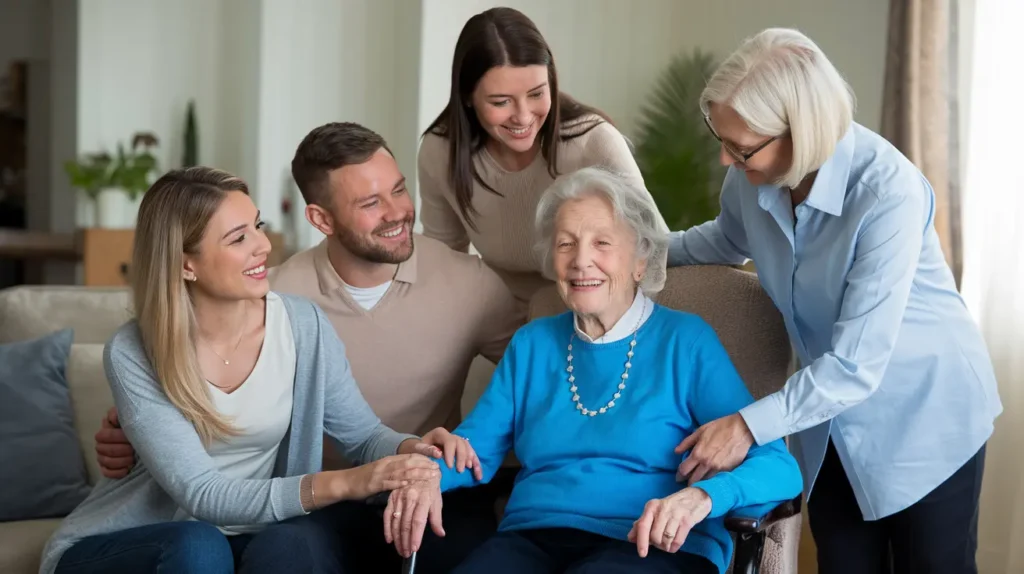
Aging in place – remaining in one’s own home – is the preference of nearly 90% of seniors. Companion care makes this possible for many who would otherwise need facility care. The familiar surroundings of home provide comfort and stability that’s especially important for seniors experiencing cognitive changes. My neighbor’s father with early dementia functions so much better in his own home where everything is familiar.
The financial advantages shouldn’t be overlooked either. The average nursing home in Indianapolis costs upwards of $7,000 monthly, while companion care can be arranged for specific hours as needed. For my family, starting with just 12 hours of weekly companion care saved us thousands compared to assisted living options we were considering.
I’ve noticed that seniors with companions tend to be more physically active too. My mom’s companion encouraged her to revive her passion for mall walking – something she had given up after her friend group moved away. Now they walk together three mornings a week, which has improved her mobility and cardiovascular health dramatically!
Family dynamics often improve with companion care in the mix. Those tense conversations about who’s handling which responsibilities transform into more pleasant family time. When my sister visits from out of state now, she can focus on quality time with Mom rather than frantically catching up on household tasks and appointments.
The customized attention is something facility care simply can’t match. My dad’s companion noticed he wasn’t eating well and discovered he was struggling with the can opener due to his arthritis. She brought an electric one the next day – problem solved! These personalized solutions make all the difference in maintaining independence.
For working families in Indianapolis, companion care bridges critical gaps in supervision and support. When winter storms hit and I couldn’t safely drive across town to check on my mother, her companion who lived nearby was able to stop in and ensure she had everything she needed. That kind of flexibility and localized support is invaluable!
Services Offered by Brightness Home Care LLC in Indianapolis
When I first contacted Brightness Home Care LLC at their West 38th Street location in Indianapolis, I was amazed at how personalized their companionship services really are. They didn’t offer a one-size-fits-all package but instead took the time to understand my mother’s unique personality and interests. For Mom, who was once an avid gardener, they matched her with a companion who shared that passion and could help maintain her beloved houseplants and discuss gardening techniques.
Their companionship activities go beyond just sitting and chatting (though that’s important too!). They include card games, puzzles, crafts, reading aloud, and reminiscing through photo albums – all tailored to what brings joy to the senior. I was particularly impressed when they arranged for my father’s companion to take him to a local veterans’ meetup after learning about his military service. Those connections with his past brought him so much happiness!
The light housekeeping assistance Brightness provides has been a lifesaver for our family. I don’t have to worry about Mom’s laundry piling up or dishes sitting in the sink. Their companions handle those everyday tasks that can become overwhelming for seniors – dusting, vacuuming, changing bed linens, and keeping the bathroom and kitchen sanitary. This isn’t deep cleaning but rather maintenance that keeps the home safe and comfortable.
Meal preparation turned out to be one of the most valuable services for my uncle, who was losing weight before starting with Brightness. Their companions plan menus with the senior’s preferences and dietary restrictions in mind, grocery shop (often with the senior when possible), and prepare nutritious meals that can be easily reheated. They even helped organize his kitchen to make it more accessible, placing frequently used items within easy reach.

Transportation is another huge benefit that Brightness provides. My aunt had given up her driver’s license, which severely limited her independence until her companion began taking her to weekly hair appointments, doctor visits, and grocery shopping. They’ll even accompany seniors to church services, community events, or family gatherings, ensuring they remain connected to their community.
Medication reminders – not administration – help seniors stay on track with their health regimens. My dad’s companion created a simple chart system that helped him remember which pills to take when, significantly reducing his confusion and ensuring he didn’t miss doses. This kind of practical support makes such a difference in maintaining health without requiring skilled nursing.
The personal care assistance offered is respectful and dignity-preserving. For seniors who need light help with bathing, dressing, or grooming, Brightness caregivers provide just enough support to maintain independence while ensuring safety and proper hygiene. My neighbor’s mother refused help from family members but accepted assistance from her professional companion – sometimes that slight distance makes these intimate tasks less embarrassing.
What stands out about Brightness Home Care is their flexibility as needs change. When my father developed mobility issues after a fall, they quickly adjusted his care plan to include more physical support around the house. Their caregivers are trained to recognize when changes might be needed and communicate those observations to both the family and their care coordination team.
Their overnight supervision options gave our family tremendous peace of mind when Mom needed someone present during the night after her surgery. The companion stayed alert while Mom slept, helping her safely to the bathroom when needed and ensuring she didn’t try to get up unassisted during her recovery period.
I’ve been particularly impressed with how Brightness handles the emotional aspects of care. When my mother experienced a period of depression after losing her sister, her companion gently encouraged her to talk about her feelings and gradually reintroduced activities she enjoyed. That kind of emotional intelligence isn’t something you can train – it comes from genuinely compassionate caregivers who understand the complex emotional needs of seniors.
How to Choose the Right Companion Care Provider in Indianapolis
When I started searching for companion care for my dad in Indianapolis, I was completely overwhelmed by the options! After making some rookie mistakes (like choosing the first agency I called – big error!), I learned to look for proper credentials first. Make sure any agency you’re considering is properly licensed in Indiana and carries liability insurance. Brightness Home Care LLC, for example, meets all state requirements and has caregivers who are bonded and insured – something I didn’t even think to ask about initially!
Don’t be shy about requesting verification of background checks! Every reputable agency performs comprehensive criminal background checks, but the depth varies considerably. I remember being shocked when one agency I interviewed couldn’t provide clear information about their screening process. Brightness conducts national background checks, drug screening, and reference verification for all their companions – that level of thoroughness gave me serious peace of mind.
Here’s a question I wish I’d asked sooner: “How do you match companions with seniors?” The matching process is crucial for building a successful relationship. Some agencies seemed to assign caregivers based solely on scheduling availability, while others like Brightness have a thoughtful matching system considering personality, interests, experience, and specific needs. When my aunt who loves classic movies was matched with a companion who shared that interest, their bond formed almost immediately!

Red flags I learned to watch for include high staff turnover (never a good sign!), reluctance to provide clear pricing information, and inflexible service minimums. One agency required a minimum of 20 hours weekly even though we only needed about 12 hours of care at that time. Brightness worked with us to create a schedule that made sense for our situation without unnecessary hours.
Another mistake I made was not asking about substitute caregivers. What happens when your regular companion is sick or on vacation? Some agencies scrambled to find last-minute replacements who knew nothing about my father’s routine, which was incredibly disruptive. Better agencies have systems in place for introducing backup caregivers before they’re needed in an emergency.
Something that made a huge difference for us was observing how potential providers interacted with my mother during the initial assessment. Did they speak directly to her or only to me? Did they ask about her preferences or make assumptions? The Brightness representative spent most of the meeting engaging directly with Mom, asking about her daily routines and preferences – treating her with dignity rather than talking around her as if she weren’t there.
Communication systems vary wildly between agencies! Some provided sporadic updates only when problems arose, while others had robust reporting methods. Brightness offers regular care notes and check-ins with family members, plus a care coordinator who serves as a consistent point of contact. When problems arise (and they will), knowing exactly who to call makes resolution so much easier.
Don’t forget to investigate caregiver training programs. Basic CPR and first aid should be absolute minimums, but the best agencies provide ongoing education in areas like dementia care, fall prevention, and senior nutrition. Brightness requires their companions to complete regular training modules to stay updated on best practices in senior care.
I made the mistake of not checking references thoroughly enough with our first agency. When you request references, ask specific questions: How did the agency handle schedule changes? Were billing practices transparent? How did they respond to feedback? These concrete questions elicit more useful information than general “were you satisfied” inquiries.
Lastly, trust your gut feeling about an agency’s culture and values. During our tours of different agencies, I noticed significant differences in office environment and staff interactions. Some felt clinical and corporate, while others like Brightness had a warm, family-oriented atmosphere where staff seemed genuinely happy. That cultural difference often translates directly to the quality of care provided in the home.
Cost of Senior Companion Care in Indianapolis
Let me be straight with you – when I first started researching companion care costs in Indianapolis, the numbers gave me serious sticker shock! But after comparing with facility care options, I realized it’s actually quite reasonable for the personalized attention received. Currently in Indianapolis, companion care typically ranges from $20-30 per hour depending on services needed and agency qualifications.
I made the mistake of choosing the cheapest option first – big lesson learned there! The agency sent different caregivers constantly, and some clearly lacked proper training. I found that mid-range providers like Brightness Home Care LLC often deliver the best value, balancing reasonable rates with quality, consistent care. Sometimes the lowest rate truly means “you get what you pay for.”
Many agencies require minimum blocks of time – often 3-4 hours per visit. This frustrated me initially since Dad only needed about 90 minutes of help in the mornings, but I came to understand that shorter visits make scheduling and travel time prohibitive for caregivers. Brightness requires a 3-hour minimum, which we eventually found ways to fill productively with additional helpful tasks.
Something I wish I’d known earlier is that most traditional health insurance plans don’t cover companion care since it’s non-medical. Medicare definitely doesn’t cover it unless it’s part of a short-term prescribed home health service. This came as a disappointing surprise to many families I’ve talked with who assumed Medicare would help with these costs.
Long-term care insurance, however, often does cover companion services – but check your policy carefully! My aunt’s policy had a 90-day elimination period before coverage kicked in, plus specific hourly caps. When we finally figured out how to properly submit claims, it reimbursed about 70% of her companion care costs, which made a huge difference in our budget.

For veterans and their spouses, don’t overlook VA Aid & Attendance benefits! My father-in-law qualified, receiving around $1,800 monthly toward his care needs. The application process was admittedly cumbersome (took nearly 6 months!), but the financial support was significant once approved.
Some families are surprised to learn that companion care can sometimes be more cost-effective than moving to an assisted living facility, especially if the senior only needs part-time support. Assisted living in Indianapolis averages $4,000-6,000 monthly regardless of how much help someone actually needs, while companion care can be scaled precisely to required hours.
I’ve seen creative arrangements work well too. My neighbor shares a companion with another senior in her apartment building – they split the cost of 8-hour days, with the caregiver dividing time between their apartments. Brightness helped coordinate this arrangement, showing flexibility that larger corporate agencies wouldn’t consider.
Don’t forget to factor in hidden costs of other care options! When we considered moving Mom to assisted living, we discovered she’d still need to pay separately for transportation to her preferred doctors and church outside their scheduled shuttle service. With companion care, transportation is typically included in the hourly rate for appointments and errands.
One cost-saving approach that worked for our family was identifying specific high-need times rather than scheduling companion visits daily. Mom struggled most with evening meal preparation and morning dressing routines, so we concentrated care hours during those specific times rather than spreading hours thinly throughout the week.
The financial conversation is never easy, but Brightness impressed me with their transparent billing practices. Some agencies added mysterious “administrative fees” or required prepayment for blocks of service, while Brightness provided detailed invoices and flexible payment options. That predictability made budgeting much more manageable for our family.
Something I didn’t initially consider was the potential tax benefits. If your loved one qualifies as a dependent and you’re paying for their care, you might be eligible for dependent care tax credits. I’m not a tax professional (definitely consult one!), but this saved our family several thousand dollars once we properly documented care expenses.
For families pooling resources to pay for a parent’s care, I recommend setting up a dedicated account with clear record-keeping. My siblings and I established a joint account specifically for Mom’s care expenses, which prevented countless disagreements about who paid for what. Some families even create formal family agreements documenting how care costs will be shared.
Don’t be afraid to have frank discussions about costs with potential agencies. I found that some were willing to create custom packages or offer slight discounts for consistent weekly schedules. Brightness worked with us to find the most cost-effective schedule that still met Dad’s needs, showing flexibility that made quality care more accessible.
Getting Started with Senior Companion Care
Taking that first step toward companion care felt overwhelming until I broke it down into manageable pieces. The initial assessment was actually eye-opening – I thought I knew everything about Dad’s daily routine, but the Brightness care coordinator asked questions I hadn’t even considered! They observed how he moved around his home, noted potential safety hazards (like that loose rug I’d been meaning to fix), and got a comprehensive picture of his needs.
The care plan they developed wasn’t just a generic checklist but a personalized roadmap. It outlined specific assistance times, personal preferences (like Dad’s insistence on shaving before breakfast, never after), and detailed instructions for various scenarios. What impressed me was how they incorporated his hobbies and interests – they noted his love of bird watching and suggested morning coffee on the porch with binoculars nearby.
Introducing the caregiver was handled with such sensitivity. Brightness arranged a “getting to know you” visit where the companion and Dad could chat informally before any care began. They discovered a shared interest in World War II history, which immediately gave them something to bond over. That initial connection made the transition so much smoother than I’d anticipated.
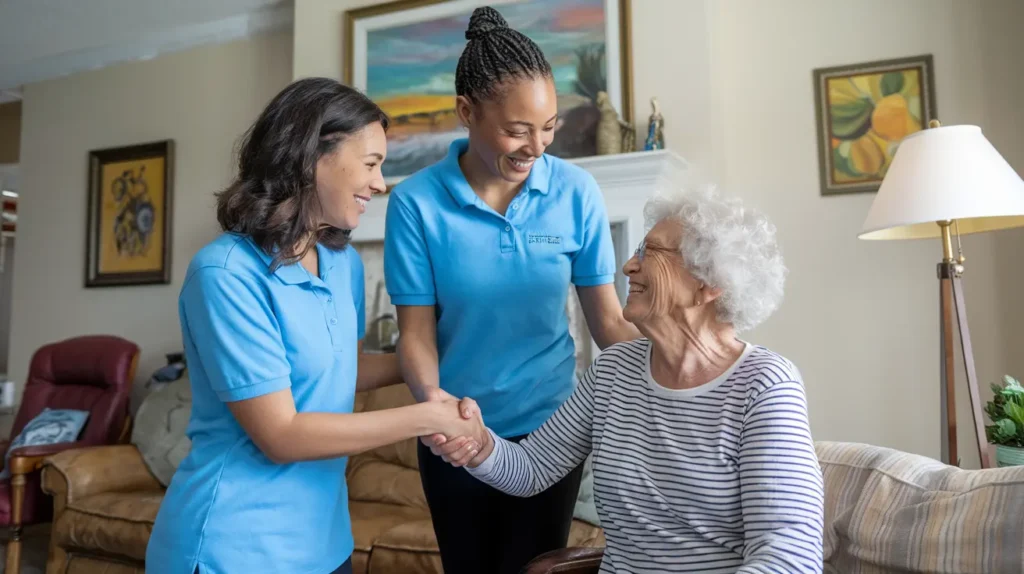
The trial period was crucial – we started with just two half-days weekly to see how things went. I’d recommend this gradual approach to anyone! It gave Dad time to adjust to having someone in his space and allowed us to fine-tune the services needed. When we noticed he was particularly struggling with meal planning, we adjusted the care plan to include more help with grocery shopping and cooking.
Communication tools were set up from day one. Brightness provided a notebook where the companion documented each visit – noting meals eaten, activities done, and any concerns. This became invaluable for tracking subtle changes in Dad’s condition over time. There was also an online portal where I could check schedules and billing, even from out of state when I traveled for work.
One unexpected challenge was managing Dad’s resistance to accepting help. The “I don’t need anyone looking after me” attitude is common! Brightness handled this beautifully by framing the companion’s role as a helper rather than a caregiver. They emphasized how the companion could assist with tasks Dad found frustrating (like technology) while respecting his independence in areas where he was capable.
Establishing routines happened naturally over the first few weeks. The companion took cues from Dad’s existing habits rather than imposing new ones. They noticed he always watched the news at 5 PM, so they planned to prepare dinner right after, working within his comfortable rhythm. These small respectful adjustments made the care feel supportive rather than intrusive.
The regular check-ins from the care coordinator surprised me – they weren’t just following up with us but proactively assessing whether adjustments were needed as Dad’s needs evolved. When he developed some balance issues, they immediately suggested additional safety measures and slightly modified the service hours to ensure coverage during his morning shower when falls were most likely.
We learned to be flexible as needs changed. Initially, we thought Dad mostly needed help with household tasks, but it became clear that social engagement was equally important. Brightness helped us adjust the care plan to include more community outings and activities that connected him with other seniors, which significantly improved his mood and cognitive engagement.
The whole process felt like a partnership rather than a service transaction. Brightness involved our family in ongoing discussions about Dad’s care, encouraged our input, and respected our knowledge of his preferences. They became an extension of our family support system, working alongside us rather than taking over – exactly what we needed during a challenging time.
Stories from Indianapolis Families (Case Studies)
Margaret’s story really resonates with me because it parallels my own experience. Her mother, a fiercely independent 82-year-old, was adamant about staying in her Irvington neighborhood home where she’d lived for 40 years. After a minor fall, Margaret contacted Brightness Home Care LLC in a panic. They matched her mother with a companion named Elaine who, coincidentally, had grown up just blocks away from her mother’s home. That shared neighborhood connection became the foundation of their relationship.

“I was expecting resistance,” Margaret told me. “But within days, Mom was calling Elaine ‘my friend who helps me with things’ rather than ‘my caregiver.’ They discovered they had both shopped at the same neighborhood grocery store for decades and knew many of the same local families. That rapport made everything else work smoothly.”
The companion helped Margaret’s mother reestablish her former routines – weekly trips to the local library, coffee with neighborhood friends, and tending to her beloved garden. When Margaret visited from out of state, she was astonished to find her mother’s spirits completely transformed. “She was herself again,” Margaret explained. “Not the anxious, isolated person I’d been worried about.”
Then there’s Robert’s father, a retired engineer with early-stage dementia who was becoming increasingly frustrated with his memory lapses. Brightness matched him with a companion who had experience with dementia care and, importantly, shared his interest in classic cars. Their regular outings to car shows and automotive museums became the highlight of his week.
“Dad’s companion found ways to work around his memory issues without making him feel diminished,” Robert explained. “She created a photo album of each car show they visited, which they’d review together, reinforcing the memories. She’d gently remind him of names and details without making it obvious she was prompting him. His self-confidence improved dramatically.”
What struck me about Robert’s story was how the companion recognized the importance of maintaining his father’s dignity. When his father insisted on paying for lunch (often forgetting he’d already offered), she’d gracefully accept the first time but have creative ways to handle the situation without embarrassing him. Those small acts of preservation of pride made a tremendous difference in his emotional wellbeing.
Sophia’s experience with her grandmother illustrates how companion care can evolve over time. What began as simple companionship—walks in the park and help with grocery shopping—gradually expanded as her grandmother’s arthritis worsened. The companion adapted, learning specific techniques to help with buttons and zippers, researching arthritis-friendly cooking tools, and modifying activities to accommodate decreased mobility.
“What impressed me most was how they never made Grandma feel like she was declining,” Sophia shared. “Instead of saying ‘you can’t do this anymore,’ her companion would say ‘let’s try this way instead.’ That positive approach kept Grandma engaged and willing to accept additional help as it became necessary.”
The companion also helped Sophia’s grandmother maintain her role in family traditions despite her limitations. When holiday cookie baking became too physically demanding, the companion helped her direct younger family members in following her recipes, preserving her place as the family’s baking expert. This creative adaptation allowed her to remain central to family gatherings rather than becoming sidelined by physical limitations.
James’ story demonstrates how companion care bridges geographical gaps. When his job required relocation to Chicago, he worried constantly about his father remaining alone in Indianapolis. Brightness Home Care provided not just physical assistance but became James’ eyes and ears, alerting him to subtle changes in his father’s health and home environment.
“Dad’s companion noticed he was having unusual trouble with his crossword puzzles—something I wouldn’t have picked up on during our phone calls,” James explained. “She suggested a vision check, which revealed early cataracts. Getting that early diagnosis before he experienced significant vision loss potentially prevented falls and other accidents.”
The companion also facilitated video calls between James and his father, setting up and managing the technology that had previously frustrated them both. Those regular visual connections allowed James to see his father’s condition firsthand and maintain their close relationship despite the distance.
Perhaps most moving was Elena’s story about her mother, who had become withdrawn and depressed after her husband’s death. The companion from Brightness recognized her mother’s untapped artistic talents and encouraged her to join a senior art class at the local community center.
“Mom had always doodled and sketched, but never pursued art seriously,” Elena told me. “Her companion not only transported her to classes but sat with her initially until she felt comfortable, then used that time to run errands while Mom was engaged in class. Now Mom’s paintings are displayed in a local senior art exhibition, and she’s developed a whole new social circle of fellow artists.”
This story particularly resonated with me because it showed how companion care isn’t just about maintaining status quo but can actually open new chapters in a senior’s life. Elena’s mother discovered a passion and purpose that had been dormant for years, significantly improving her mental health and creating new connections within her community.
Conclusion
Looking back on my family’s journey with senior companion care in Indianapolis, I’m struck by how transformative it’s been, not just for my parents but for our entire family dynamic. The right companion care doesn’t just fill gaps in daily assistance – it creates new possibilities for connection, dignity, and joy in the senior years.
As you consider options for your loved ones, remember that companion care isn’t admitting defeat or giving up independence – it’s actually a powerful tool for preserving autonomy and extending the ability to age in place. I’ve seen firsthand how the right support at the right time can prevent crisis situations and keep seniors in their beloved homes for years longer than would otherwise be possible.
Every family’s needs are unique, and the beauty of services like those offered by Brightness Home Care LLC is their flexibility. Whether you need a few hours of weekly assistance or more comprehensive daily support, there’s a configuration that can work for your situation. The key is starting the conversation early, before a crisis forces rushed decisions.
Safety considerations should always be paramount when arranging companion care. Ensure providers conduct thorough background checks, verify references, and properly train their caregivers. Don’t hesitate to ask detailed questions about their screening and training processes – reputable agencies like Brightness Home Care welcome this level of diligence from families.
If you’re feeling overwhelmed by the process, remember you’re not alone. Thousands of Indianapolis families navigate these decisions every year. Reach out to Brightness Home Care LLC at their West 38th Street location for guidance specific to your situation. Their team has helped countless families create care plans that balance independence with necessary support.
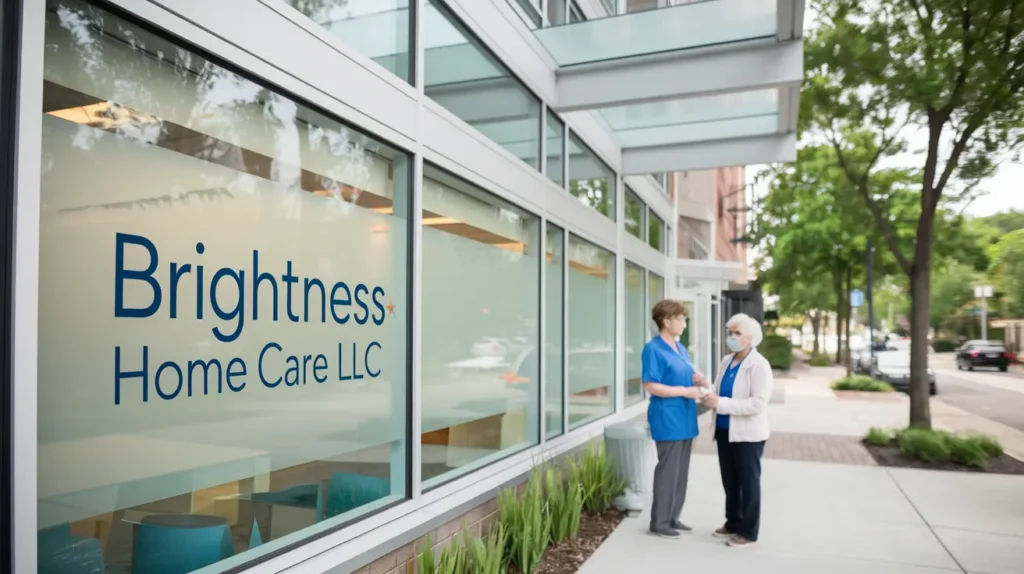
I encourage you to take that first step – even if it’s just an informational call to learn more about options. The peace of mind that comes from having a plan in place is invaluable, even if you don’t need services immediately. And for those already struggling with caregiver burnout, please know that seeking help is a sign of strength, not weakness.
Would you take a moment to share your own experiences with senior care in the comments? Your insights might be exactly what another family needs to hear as they begin this journey. We’re all in this together, and our collective wisdom makes each family’s path a little easier to navigate.
Remember, the goal isn’t just adding years to life, but adding life to years. Quality companion care can make those years richer, safer, and more connected for the seniors we love. Reach out to Brightness Home Care LLC today to start the conversation about how they can support your family’s unique needs.

